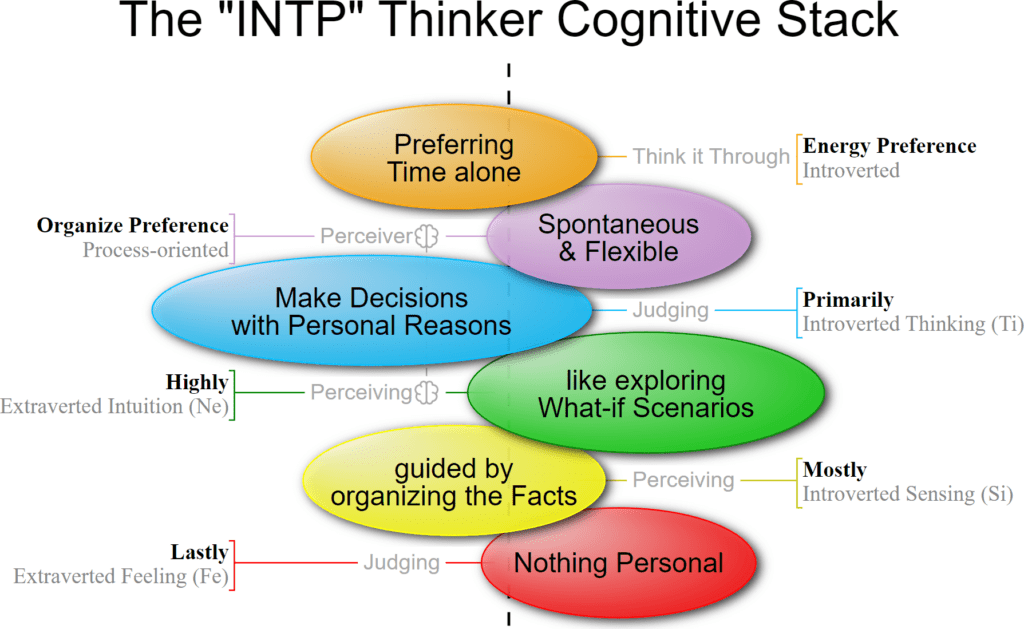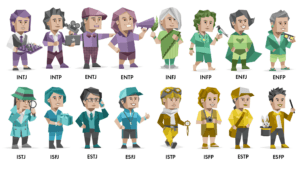What is the MBTI INTP “Thinker” Personality Type?

People with INTP Personality Type are often described as quiet and analytical.
They enjoy spending time alone, thinking about how things work, and finding solutions to problems.
Thinkers have a rich inner world and would instead focus on their thoughts rather than the external world.
They typically do not have a wide social circle but tend to be close to a select group.
With Introverted Thinking as their dominant function, Thinkers use personal subjective reasons when making decisions.
With Extraverted Intuition as their principal extraverted function, Thinkers are Perceivers looking for broad concepts and patterns and are highly interested in “what-if” scenarios.

Thinkers like to organize the facts with their introverted sensing with little emotion, which is the lowest function of their extraverted feeling.
Thinkers are introverted, preferring time alone to think things through. They are process-oriented, spontaneous, and flexible.
Thinkers are “Abstract Perceivers” with Introverted Thinking and Extraverted Intuition. When feeling threatened, they will use dry, emotionally disconnected theoretical language and may behave with the Computer Satir Communication Style.
INTP Personality Type cross-reference
- Keirsey Type – Architect
- Temperament Type – Choleric
- Animal Type – Lion
- DISC Type – Dominant
- Socio-Communicative Type – Driver
- True Colors – Green
- Color Code – Red
- Personality Compass – North
- Occupational Type – Enterprising
- Learning Type – Activist
- Leadership Type – Dominator
Enneagram Types
The Enneagram is a Personality Typing System comprising nine different types.

Dominant Function – Introverted Thinking
- This function focuses on how people absorb information about the world.
- They express this by trying to understand how things work.
- They often like to break down more important things or ideas into individual components to see how items fit and function together.
- They tend to be highly logical and efficient thinkers.
- They like to completely understand something before they are willing to share an opinion or take action.
Auxiliary Function – Extraverted Intuition
- They express this cognitive function by exploring what-ifs and possibilities.
- They utilize insight, imagination, and past experiences to form ideas.
- They often review what they know, seeking patterns until they find inspiration or insight into the problem.
- They spend a great time thinking about the future and imagining all the possibilities.
Tertiary Function – Introverted Sensing
- They tend to be very detail-oriented, carefully categorizing the many facts and experiences they take in.
- As they collect new information, they compare it with what they already know to predict what will happen next.
Inferior Function – Extraverted Feeling
- They tend to seek harmony in groups.
- While introverted, they can be pretty outgoing when they are around people with whom they are familiar and comfortable.
- When stressed, they shut down their feelings and struggle to connect with others.
- Under stress, they tend to rely on logic rather than feelings.
INTP Traits
INTPs are quiet, reserved, thoughtful, logical, and abstract individuals.
As introverts, they prefer to socialize with a small group of close friends with whom they share common interests and connections.
They are not naturally in tune with other people’s feelings and may not display affection or approval when needed.
Their primary function is Introverted Thinking, while their auxiliary function is Extraverted Intuition. This makes them abstract thinkers more interested in theoretical concepts and ideas than what is immediate.
They are often disengaged from the world around them and prefer to observe and understand rather than participate and work.
INTPs are problem solvers, but once they have devised a solution, they prefer to leave it to others to implement.
They constantly seek knowledge, approach situations objectively, and seek to understand.
INTPs often look to learn proficiency but rarely look for mastery with little concern for detail and prefer to look at the bigger picture.
They constantly analyze the world around them and are more concerned with temporal change than all other things.
If something is of little use to the INTP, it will often disappear from their mind.
INTPs are logical and base decisions on objective information rather than subjective feelings.
They enjoy thinking about theoretical concepts and value intellect over emotion.
INTPs tend to be flexible and good at thinking “outside of the box.” They think about the big picture rather than focusing on every tiny detail.
They keep their options open and feel limited by structure and planning.
A weakness of the INTP is an unwillingness to try new things, as the INTP may be uncomfortable with strange items.
Under stress, they may have an unhealthy habit of showing intense emotion, leading to other personal problems.
Strengths
- Logical and objective
- Abstract thinker
- Independent
- Loyal and affectionate with loved ones
Weaknesses
- Difficult to get to know
- Can be insensitive
- Prone to self-doubt
- Struggles to follow rules
- They have trouble expressing feelings
INTP Relationships
Friendships
- Shared interests are one of the best paths to forming a friendship with an INTP.
- They value intellect over all else.
- They can be very slow to form friendships.
- While this often leads to fewer friendships, the ones that an INTP does gain tend to be very close.
- Remember that your INTP friends may not be the best at dealing with excess emotions.
- Still, they love to bond over deep conversations and shared passions.
Personal Relationships
- As introverts, they prefer spending time alone for the most part.
- Unlike extraverts, who gain energy from interacting with a broad group of people, introverts must expend energy in social situations.
- After being around many people, they might feel they must spend time alone to recharge and find balance.
- While they may be shy around people they do not know well, they tend to be warm and friendly with their close family and friends.
- Because they enjoy solitude and deep Thinking, they sometimes strike others as aloof and detached.
- People with this personality type can get lost in their thoughts and lose track of the outside world.
- They love ideas and place a high value on intelligence and knowledge.
- They tend to be quite easygoing and tolerant in social situations.
- However, they can become unyielding when their beliefs or convictions are challenged.
- Their high emphasis on logic can make it difficult not to correct others when others present arguments that are not rational or logical.
- They can also be challenging to persuade because they rely on their minds rather than others.
Partner Relationships
- They tend to live inside their minds, making it difficult to get to know them.
- Even in romance, they often hold back until they feel the other person has proven themselves worthy of hearing these innermost thoughts and feelings.
- Remember that while INTPs enjoy romance in a deeply committed relationship, they do not play games. Be honest and forthright.
- Because they are not good at understanding the emotional needs of others, you may need to be very direct about what you need and expect in that regard.
- They also struggle to share their feelings, so you may need to notice subtle signals your partner sends.
Parenting
- If your child is an INTP, it is essential to remember that your child may respond better to reason and logic rather than appeals to emotion.
- Please encourage your child to develop their intellectual interest, but also look for situations that may help your child foster friendships.
- This can be an area where your child struggles, but it can also be helpful to put them in contact with other kids with the same interests.
INTP Careers
- Because they enjoy theoretical and abstract concepts, INTPs often do particularly well in science-related careers.
- They are logical, have strong reasoning skills, and are also excellent at thinking creatively.
- INTPs can be very independent and place a great deal of emphasis on personal freedom and autonomy.
- In some cases, they can be aggravated by authority figures, particularly those they feel are trying to suppress their ability to think and act for themselves.
- Because of this, INTPs typically do best in careers as they have great flexibility and independence.


